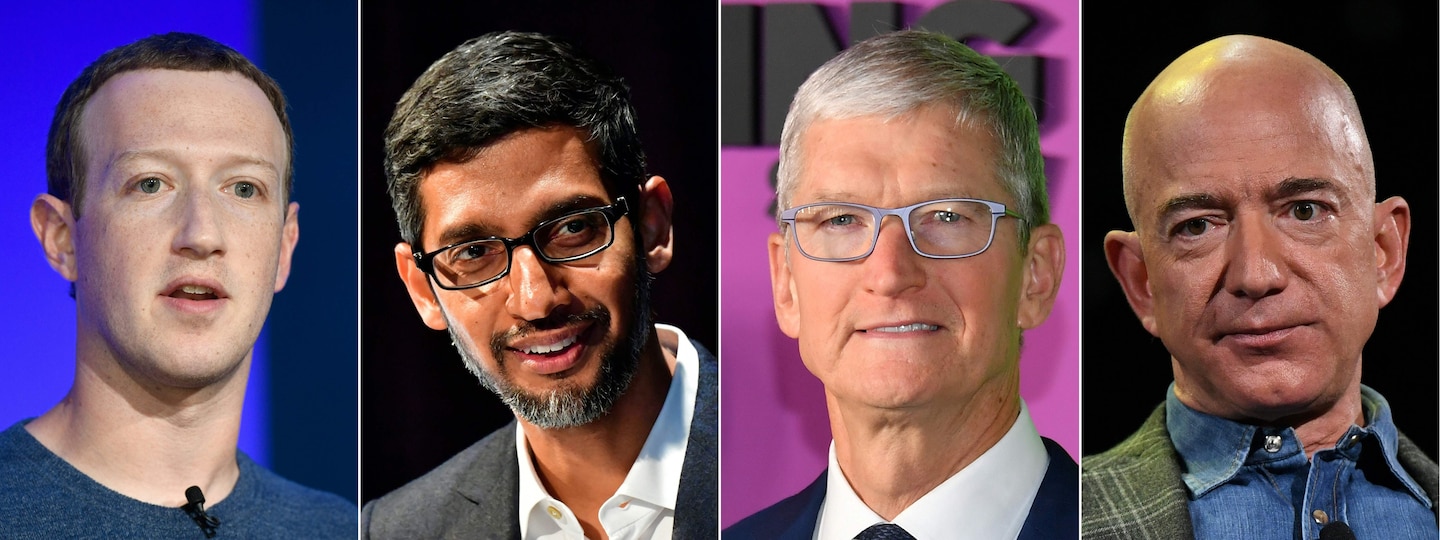Big tech executives tout consumer benefits ahead of House hearing

“At Amazon, customer obsession has made us what we are, and allowed us to do ever greater things,” Bezos wrote.
(Bezos owns The Washington Post.)
Bezos will swear an oath and appear at the hearing alongside Facebook’s Mark Zuckerberg, Apple’s Tim Cook and Google’s Sundar Pichai. Lawmakers are examining the clout of the tech behemoths that represent a nearly $5 trillion slice of the U.S. economy.
Other tech executives’ planned testimony also surfaced Tuesday evening.
At the hearing, Zuckerberg plans to emphasize Facebook’s value in connecting people and supporting businesses during the pandemic, and the fact that the social network competes with the companies at the hearing, according to testimony obtained by The Post. He plans to note that when Facebook moved its headquarters to the campus of a former tech giant, Sun Microsystems, he kept the company’s sign up front to remind employees to stay competitive because success can be fleeting.
He is also expected to emphasize that Facebook’s success has been grounded in the American values of democratic expression and competition, and compare that with the approach taken by China as a rising tech power.
In his prepared testimony, Pichai touts the company’s popular Internet services as major benefits for consumers and small businesses. Google products such as Search and Maps are free for everyone, he noted, and the company invests billions of dollars in research and development every year. He pointed to Amazon’s Alexa and Twitter’s news feed as competitors to Google Search, one of the areas the committee is probing.
Pichai repeated a familiar claim that Google and its competitors in online advertising help bring down costs for advertisers. Google is the dominant player in digital advertising, and critics have questioned the company’s power because it controls both the advertising framework and many of the websites on which ads appear.
“We also deliberately build platforms that support the innovation of others,” he said, pointing specifically to Google’s Android operating system.
Cook plans to stress that consumers have a choice. Namely, they can use Google’s operating system on a device made by Samsung or Google itself.
“The smartphone market is fiercely competitive,” he wrote, according to his prepared testimony.
In recent months, developers that were once mum about the company’s practices have come forward with public statements criticizing the way Apple uses its power.
Cook tried to set Apple apart by highlighting the company’s focus on privacy and security. And he said Apple created the app store in part to help “creators large and small to not only bring their ideas to life, but to reach millions of users and build a successful business in the process.”
Without addressing any specific criticism of it, Cook called the App Store “an economic miracle,” citing a study that found the App Store ecosystem facilitated $500 billion in commerce worldwide and $138 billion in the United States.
Bezos’s written testimony anticipates several of the topics lawmakers will probably grill him on during Wednesday’s hearing. Rather than focus on online commerce, Bezos sought in his testimony to define the retail market more broadly, and in a manner that diffuses Amazon’s clout. Amazon accounts for less than 1 percent of the $25 trillion global retail market, Bezos wrote, and less than 4 percent of retail in the United States. And although Amazon rarely talks about competitors, Bezos specifically cited Target, Costco, Kroger and Walmart, which he added is “a company more than twice Amazon’s size.”
A key area of focus for lawmakers is likely to be whether Amazon gives its own products unfair advantages over offerings from rivals on its digital marketplace, an allegation Bezos aimed to counter. The third-party sellers on Amazon account for approximately 60 percent of physical product sales on the site, and those sales are growing faster than Amazon’s own retail sales, Bezos wrote.
The written testimony did not address the allegation that Amazon uses data collected from third-party merchants to launch its own competing products, an issue that lawmakers on the same subcommittee pressed an Amazon lawyer about a year ago.
Bezos began his written testimony with a folksy refrain on his upbringing and the emergence of Amazon. He started by writing about his mother’s struggles giving birth to him when she was a 17-year-old high school student in Albuquerque. And he wrote about his decision to launch Amazon, an idea his boss at the time told him was “a better idea for somebody who didn’t already have a good job.” He worked in finance in New York at the time.
“When I’m 80 and reflecting back, I want to have minimized the number of regrets that I have in my life,” Bezos wrote. “And most of our regrets are acts of omission — the things we didn’t try, the paths untraveled.”
The hearing Wednesday will be Bezos’s first time testifying before Congress. In his written testimony, Bezos said, as he has previously, that he welcomes the inquiry.
“We should scrutinize all large institutions, whether they’re companies, government agencies, or non-profits,” Bezos wrote. “Our responsibility is to make sure we pass such scrutiny with flying colors.”
Elizabeth Dwoskin, Rachel Lerman and Reed Albergotti contributed to this report.






